Becoming Nietzsche
Becoming Nietzsche
Early Reflections on Democritus,
Schopenhauer, and Kant
Paul Swift

LEXINGTON BOOKS
Published in the United States of America
by Lexington Books
An imprint of The Rowman & Littlefield Publishing Group, Inc.
4501 Forbes Boulevard, Suite 200, Lanham, Maryland 20706
PO Box 317
Oxford
OX2 9RU, UK
Copyright 2005 by Lexington Books
All rights reserved. No part of this publication may be reproduced, stored in a retrieval system, or transmitted in any form or by any means, electronic, mechanical, photocopying, recording, or otherwise, without the prior permission of the publisher.
British Library Cataloguing in Publication Information Available
Library of Congress Cataloging-in-Publication Data
Swift, Paul A., 1967
Becoming Nietzsche : early reflections on Democritus, Schopenhauer, and Kant / Paul A. Swift.
p. cm.
Includes bibliographical references and index.
ISBN 978-0-7391-2320-1
1. Nietzsche, Friedrich Wilhelm, 18441900. 2. Democritus. 3. Schopenhauer, Arthur, 17881860. 4. Kant, Immanuel, 17241804 I. Title.
B3317.S95 2005
193dc22
2005001171
Printed in the United States of America
 The paper used in this publication meets the minimum requirements of American National Standard for Information SciencesPermanence of Paper for Printed Library Materials, ANSI/NISO Z39.481992.
The paper used in this publication meets the minimum requirements of American National Standard for Information SciencesPermanence of Paper for Printed Library Materials, ANSI/NISO Z39.481992.
Contents
Key for Citations:
The following abbreviations are used for citing Nietzsches work and some the texts of Diogenes Laertius, Kant, and Schopenhauer.
Diogenes Laertius: |
Lives of the Eminent Philosophers | (DL) |
Writings by Nietzsche: |
The Antichrist | (A) |
Frhe Schriften | (BAW) |
Beyond Good and Evil | (BGE) [1885] |
Birth of Tragedy Out of the Spirit of Music | (BT) [1872] |
Briefwechsel | (BW) |
Dawn | (D) [1881] |
Ecce Homo | (EH) [1889] |
Fragment of a Critique of the Schopenhauerian Philosophy | (FKSP) [1867] |
The Gay Science | (GS) [1882] |
The Genealogy of Morals | (GM) [1887] |
Kritische Gesamtausgabe | (KGW) |
Kritische Studienausgabe | (KSA) |
Philosophy in the Tragic Age of the Greeks | (PTA) [1873] |
Twilight of the Idols | (TI) [1889] |
Truth and Lie in a Non-moral Sense | (TL) [1873] |
The Will to Power | (WP) |
Teleology Since Kant | (TSK) [1868] |
Thus Spake Zarathustra | (Z) [1883-5] |
Works by Kant: |
Anthropology from a Pragmatic Point of View | (Anth) [1798] |
Critique of Pure Reason | (KRV) [1781] |
Critique of Judgment | (KU) [1790] |
Works by Schopenhauer: |
Paraerga and Parapelomena | (PP) [1851] |
The World as Will and Representation | (WWR) [1818] |
When possible, I have used Walter Kaufmanns translations of Nietzsches work, Pluhars translation of the Critique of Judgment, and Paynes translation of Schopenhauer. I have also used Daniel Brazeales translation for some of Nietzsches notes from the 1870s, as well as some of the translations from Gilman, Blair, and Parent. Translations cited from BAW and KSA are my own unless otherwise indicated.
Preface
During the early 1990s I began Becoming Nietzsche while investigating Nietzsches philosophical reflections from his university years. At that time the 1995 reprint of the 1940 historical edition of Nietzsches work (the Beck edition) had not yet appeared and the Kritische Gesamtausgabe still had not been amended to include any of Nietzsches work prior to 1869. By chance I discovered Teleologie Seit Kant (1868) in the old Musarion edition of Nietzsches work, a surprising and exciting moment for me, as I was working on a dissertation connecting Kants Critique of Judgment to Nietzsches Birth of Tragedy. It was then that I realized that very little investigation had been done on Nietzsches philosophical reflections during the period of 1866 to 1868. Due to the general lack of familiarity by most scholars with Nietzsches work prior to 1869, there was an abundance of misleading claims in the secondary literature about Nietzsches relationship to both Kant and Schopenhauer.
In my survey of Nietzsches surviving philosophical reflections from 1866 to 1868, his investigations of Democritus, Schopenhauer, and Kant seemed to stand out from his philosophical notebooks, as Nietzsche devoted considerable time and reflection to these thinkers. These three philosophers helped shaped Nietzsches interests during this important formative period in his philosophical development. Written after Nietzsches discovery of Schopenhauer but before he met Wagner or encountered Hartmann, this period of Nietzsches surviving philosophical reflections is punctuated with the influence of Friedrich Lange, an influence that persists throughout Nietzsches philosophic career.
The investigation of this early phase of Nietzsche raises questions about what we are to make of Nietzsches 1866-8 writings. What significance or value do they hold? Are they important for understanding Nietzsches other works? Some of these questions are already familiar to Nietzsche specialists because of Nietzsches other numerous posthumously published works that raise the same concerns, such as the Nietzsche lectures on language and rhetoric, Philosophy in the Tragic Age of the Greeks, Truth and Lie in a Non-moral Sense, The Will to Power, etc. What importance do such works have for assessing Nietzsche as a philosophical thinker, when such works were not intended by the author for publication?
Although these questions are sometimes viewed as secondary in terms of philosophic importance, almost anyone who seeks a comprehensive view of Nietzsche must address them due to the peculiar circumstances of Nietzsches Will to Power, a work that Nietzsche started but later abandoned. As Magnus and others have shown, Nietzsche gave up on a book to be published as The Will to Power, but it was still sewn together for publication after Nietzsches death, in part for financial gain as well for political purposes, an infamous scandalous chapter in the history of ideas. The Will to Power provides fascinating accounts from Nietzsches creative life, providing variations of arguments and analyses that give us a glimpse into his philosophic acumen and rhetoric. However, some scholars who deal with Nietzsche do not focus much on such work, since it never reached a final form for publication according to Nietzsches wishes. After all, some of
Next page

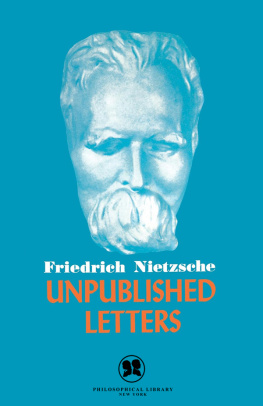


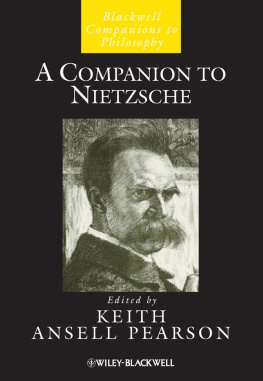
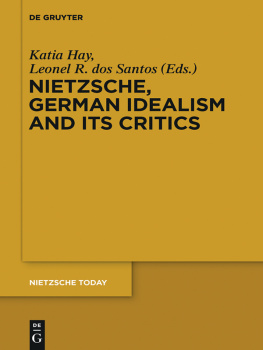

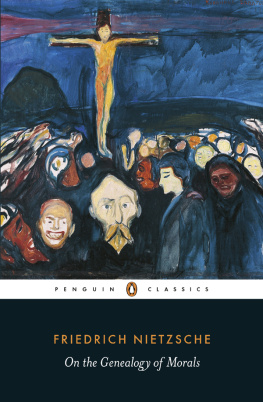
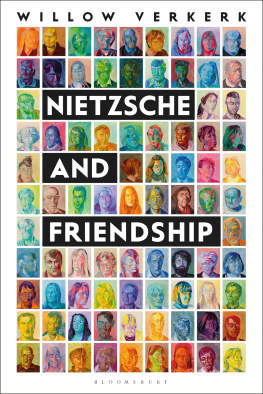
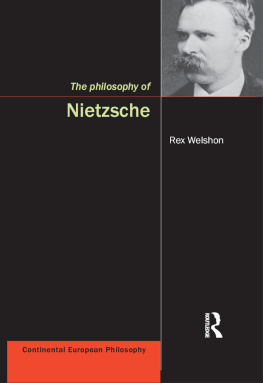
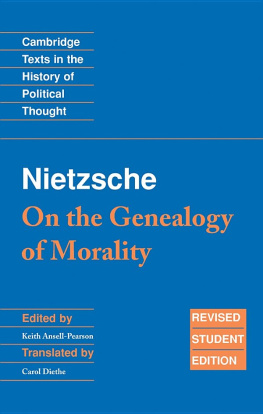

 The paper used in this publication meets the minimum requirements of American National Standard for Information SciencesPermanence of Paper for Printed Library Materials, ANSI/NISO Z39.481992.
The paper used in this publication meets the minimum requirements of American National Standard for Information SciencesPermanence of Paper for Printed Library Materials, ANSI/NISO Z39.481992.